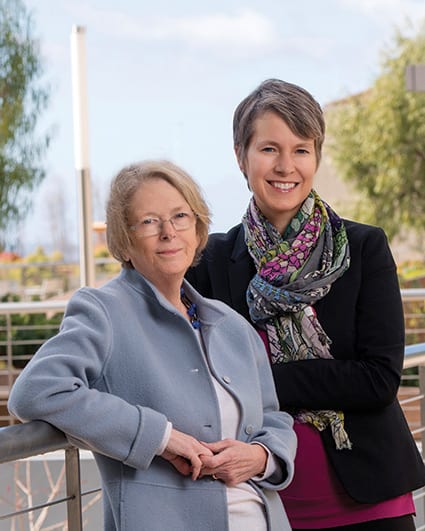
Two generous gifts—one that looks back and one that looks forward—have powerfully reaffirmed Berkeley Law’s mission of innovation.
The Herma Hill Kay Memorial Lecture, created with a seed gift from Professor Pamela Samuelson and her husband Dr. Robert Glushko, honors the iconic pioneer who taught at Berkeley Law for 57 years and was its first female dean. Kay died last year at age 82.
Gifts bequeathed by Harold Hohbach ’52 have created in his name a distinguished professorship in patent law and intellectual property (IP), as well as a law, technology, and IP fund. Hohbach died in December at age 96 after a remarkable career as a patent litigator, investor, and developer.
Kay also had a remarkable career. Just the second woman to join Berkeley Law’s faculty, she wrote seminal works on sex-based discrimination, family law, conflict of laws, and diversity in legal education. She was also a role model and mentor for numerous women in the legal profession.
“Herma will be remembered for her contributions to family law, and to the broader representation of women in the legal community,” Samuelson says. “But she also inspired me to believe that women can do anything, and that’s the thing I prize the most. You should honor the people who are your pioneers.”
In 2015, Kay received the Association of American Law Schools’ Ruth Bader Ginsburg Lifetime Achievement Award from Ginsburg herself. Fittingly, Ginsburg will give the inaugural Herma Hill Kay Memorial Lecture next year.
A pioneering spirit also underscores the Harold C. Hohbach Distinguished Professorship, which aims to encourage study of the relationship between technological innovation and economic growth. Its first recipient, Molly Van Houweling, does just that.
A Berkeley Law faculty member since 2005, Van Houweling chairs the Creative Commons board of directors. She has long been fascinated by how the law supports (and sometimes unintentionally hampers) individuals’ access to inventive and creative opportunities in the digital age.
Like Hohbach, Van Houweling sees the links between IP law and tangible property. “Both are justified in part by the importance of the law giving people incentives to invest in things that are valuable to them and to society,” she says.
Coincidentally, Hohbach and Van Houweling share roots in South Dakota, where he was born and her relatives were homesteading farmers.
“I’m so glad his journey included a stop at Berkeley Law,” she says, “and that his generosity now helps support our efforts to educate the next generation of innovative law students who will transform their own lives and the world.”
